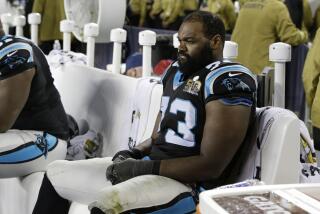Book review: âI Beat the Oddsâ by Michael Oher with Don Yaeger
By his own admission, Michael Oher preferred to observe rather than participate in social settings when he was a young man. In fact, his silence was so disconcerting to social workers in Memphis, Tenn., he says, that it was misdiagnosed as repressed rage, and he was locked up in a hospital for observation.
Oherâs reticence left it to others to tell his story â of a black child in Memphisâ inner city who was neglected by his mother and essentially had no place to call home but ultimately blossomed when a rich, white family took him in and introduced him to the twin satisfactions of athletic and academic achievement. Michael Lewis chronicled it in a book, âThe Blind Side: Evolution of a Game,â in 2006, and Hollywood brought it to the screen in âThe Blind Sideâ three years later.
Now Oher has decided itâs time to tell his story himself, in âI Beat the Odds: From Homelessness to âThe Blind Sideâ and Beyond,â which he wrote with Don Yaeger, formerly of Sports Illustrated. The confidence gained from his accomplishments and the attention that comes with being a star offensive lineman with the NFLâs Baltimore Ravens have unleashed his spirit of expression.
Besides, Oher says he has a mission. Since the movie came out, he has been deluged with letters from kids in circumstances as desperate as his once were, he writes, and he wanted to encourage them while also providing specific advice on how they too might beat their long odds.
Lewisâ richer telling of the tale and the movie both skip over Oherâs early life and focus instead on his time at an exclusive private school, which welcomed him because of his considerable athletic gifts. Oher fills in this gap, and his stories are alternately heart-rending and infuriating.
âNo one in my family â not my mother or my brothers or my sisters or my grandmother â no one ever said the words âI love you,ââ he writes. âI never once remember hearing that as a child.â
Nor was it evident in action. He relates that his mother was much fonder of crack cocaine than she was of her 12 children and would often disappear for long stretches and leave them to fend for themselves. This led to his assignment to Memphisâ foster-care system, a nomadic existence of successive homes â and schools.
Oherâs main beef with the movie is that it âportrayed me as dumb instead of as a kid who had never had consistent academic instruction and ended up thriving once he got it.â
Indeed, it is thrilling to read of Oherâs hunger for learning once the teachers at Briarcrest Christian School tapped it. For example, an English teacher required that students memorize a literary passage, and Oher was so excited about mastering his that he tracked her down in the lunch line and recited it on the spot.
âMy last semester in high school, I made the honor roll, which remains one of the proudest accomplishments in my life,â he writes. And this from someone who was selected in the first round of the NFL draft.
Itâs unfortunate that Michael Oherâs opportunity to flower in life was made possible primarily because of his prowess in sports. But you get the profound sense that even had this young man suffered a career-ending knee injury at the University of Mississippi, the seeds of hard work and responsible behavior had already been planted, and those odds would still have been beaten in a crushing block.
Noland covered the NFL for the Los Angeles Daily News from 1982 to 1998, including the Raiders beat for 12 of the 13 years they spent in Los Angeles.
More to Read
Sign up for our Book Club newsletter
Get the latest news, events and more from the Los Angeles Times Book Club, and help us get L.A. reading and talking.
You may occasionally receive promotional content from the Los Angeles Times.








